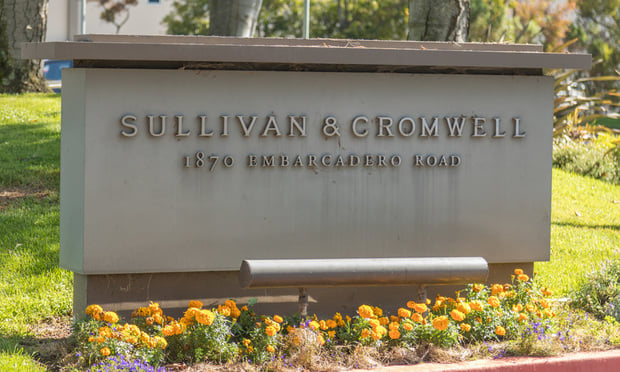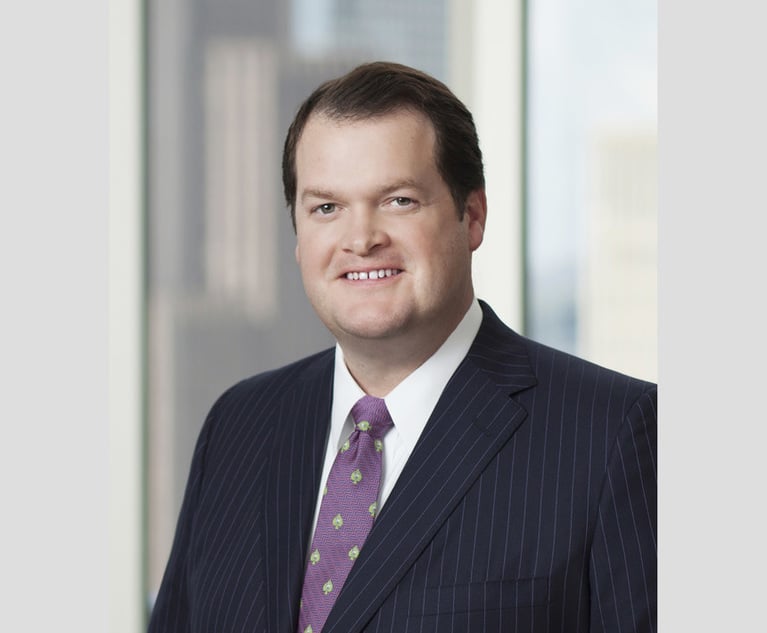Sullivan & Cromwell Sued for Alleged Conflict in Arbitration Over Laos Project
A former Skadden associate said that after an arbitration panel chaired by a Sullivan partner awarded his client $56 million from the Laos government, the firm then represented an arm of that government in fighting the award.
December 20, 2019 at 03:45 PM
4 minute read
 Sullivan & Cromwell. Photo: Jason Doiy/The Recorder
Sullivan & Cromwell. Photo: Jason Doiy/The Recorder
A former Skadden, Arps, Slate, Meagher & Flom associate has sued Sullivan & Cromwell in New York state court for $13 million, accusing the firm of double-dealing in an international arbitration matter in which a partner served as chair of the panel.
Andrew Delaney, a New York attorney who has represented clients in Southeast Asia since 1993, represented a Thai company that developed a coal-fired power plant in Laos that was expropriated by the country's government. According to the complaint, after an arbitration panel chaired by a Sullivan partner awarded his client $56 million, the firm then represented the government of Laos to fight the award.
"Sullivan & Cromwell, after serving as the chairman of the arbitration and after signing the arbitration for nearly $60 million, then became the … losing party's representatives in opposing all steps to enforce that award worldwide," said attorney Christopher Beres, who will be representing Delaney in the matter. "The facts scream impropriety."
Delaney is initially representing himself pro se in the case, which was filed in Manhattan civil court Wednesday. But Beres, who like Delaney has a lengthy history of representing parties in Southeast Asia, said he would be filing an entry of appearance next week to serve as Delaney's counsel.
According to the complaint, Delaney worked in Skadden's foreign practice group in New York and Hong Kong after graduating law school in 1988, and then in 1992 he began representing several arms of a Thai company that sought to develop an 1,800-megawatt coal plant in Laos.
Those two businesses, Thai-Lao Lignite Co. Ltd. and Hongsa Lignite Co. Ltd., later inked a joint venture agreement with Thailand's largest private energy company, Banpu Public Co. Ltd., which then allegedly terminated the agreement and used confidential and proprietary information to take over the project.
In response, Delaney advised the two businesses on contingency in an investor-state arbitration against the Laos government. The project development agreement mandated three panelists, and Delaney's clients picked an attorney from Skadden while the Laos government picked an attorney from Jones Day. Those two agreed to bring on Sullivan partner James Carter, now senior counsel at Wilmer Cutler Pickering Hale and Dorr, to chair the panel.
Delaney said in the complaint that he was on board with Carter's selection, as he believed Sullivan's sterling international reputation would be helpful in enforcing an award if his client won.
In 2009, Delaney's clients, who had sought $1 billion in the arbitration, were awarded $56.2 million along with 9% interest, according to the complaint. But the Laos government has fought the award across the world, allegedly spending $1 million on lawyers between 2010 and 2016. In 2017, the highest court in Malaysia, where the arbitration was seated, overturned the award, concluding the arbitrators had erred.
At some point after the award was issued, Delaney discovered that Sullivan & Cromwell had been representing Laos' central bank in order to fight its enforcement. The firm's lawyers in New York vacated a judgment against the Laos government in New York federal court, and lawyers in London succeeded in blocking an enforcement action there.
The complaint also said Sullivan & Cromwell attorneys had filed an amicus brief with the U.S. Supreme Court in a case challenging the enforceability of foreign arbitration awards. Among the names on that brief was Joseph Neuhaus, who represented Bank of the Lao.
Delaney said in the complaint that he had suffered $3 million in damages from his clients' failure to collect the arbitration award, adding that they had informed him they would no longer work with him. He's also seeking $10 million in punitive damages, arguing that Sullivan acted in bad faith by representing the Laos government in dodging an award that the firm's partner had issued and signed.
A spokesman for Sullivan & Cromwell did not immediately respond to a request for comment.
Read More
Litigator of the Week: Joseph Neuhaus of Sullivan & Cromwell
Third-Party Financers Are Fueling Investor-State Arbitration Battles
This content has been archived. It is available through our partners, LexisNexis® and Bloomberg Law.
To view this content, please continue to their sites.
Not a Lexis Subscriber?
Subscribe Now
Not a Bloomberg Law Subscriber?
Subscribe Now
NOT FOR REPRINT
© 2025 ALM Global, LLC, All Rights Reserved. Request academic re-use from www.copyright.com. All other uses, submit a request to [email protected]. For more information visit Asset & Logo Licensing.
You Might Like
View All
O'Melveny, White & Case, Skadden Beef Up in Texas With Energy, Real Estate Lateral Partner Hires
5 minute read
Energy Lawyers Field Client Questions as Trump Issues Executive Orders on Industry Funding, Oversight
6 minute read
Holland & Knight Hires Former Davis Wright Tremaine Managing Partner in Seattle
3 minute read
Law Firms Mentioned
Trending Stories
- 1Uber Files RICO Suit Against Plaintiff-Side Firms Alleging Fraudulent Injury Claims
- 2The Law Firm Disrupted: Scrutinizing the Elephant More Than the Mouse
- 3Inherent Diminished Value Damages Unavailable to 3rd-Party Claimants, Court Says
- 4Pa. Defense Firm Sued by Client Over Ex-Eagles Player's $43.5M Med Mal Win
- 5Losses Mount at Morris Manning, but Departing Ex-Chair Stays Bullish About His Old Firm's Future
Who Got The Work
J. Brugh Lower of Gibbons has entered an appearance for industrial equipment supplier Devco Corporation in a pending trademark infringement lawsuit. The suit, accusing the defendant of selling knock-off Graco products, was filed Dec. 18 in New Jersey District Court by Rivkin Radler on behalf of Graco Inc. and Graco Minnesota. The case, assigned to U.S. District Judge Zahid N. Quraishi, is 3:24-cv-11294, Graco Inc. et al v. Devco Corporation.
Who Got The Work
Rebecca Maller-Stein and Kent A. Yalowitz of Arnold & Porter Kaye Scholer have entered their appearances for Hanaco Venture Capital and its executives, Lior Prosor and David Frankel, in a pending securities lawsuit. The action, filed on Dec. 24 in New York Southern District Court by Zell, Aron & Co. on behalf of Goldeneye Advisors, accuses the defendants of negligently and fraudulently managing the plaintiff's $1 million investment. The case, assigned to U.S. District Judge Vernon S. Broderick, is 1:24-cv-09918, Goldeneye Advisors, LLC v. Hanaco Venture Capital, Ltd. et al.
Who Got The Work
Attorneys from A&O Shearman has stepped in as defense counsel for Toronto-Dominion Bank and other defendants in a pending securities class action. The suit, filed Dec. 11 in New York Southern District Court by Bleichmar Fonti & Auld, accuses the defendants of concealing the bank's 'pervasive' deficiencies in regards to its compliance with the Bank Secrecy Act and the quality of its anti-money laundering controls. The case, assigned to U.S. District Judge Arun Subramanian, is 1:24-cv-09445, Gonzalez v. The Toronto-Dominion Bank et al.
Who Got The Work
Crown Castle International, a Pennsylvania company providing shared communications infrastructure, has turned to Luke D. Wolf of Gordon Rees Scully Mansukhani to fend off a pending breach-of-contract lawsuit. The court action, filed Nov. 25 in Michigan Eastern District Court by Hooper Hathaway PC on behalf of The Town Residences LLC, accuses Crown Castle of failing to transfer approximately $30,000 in utility payments from T-Mobile in breach of a roof-top lease and assignment agreement. The case, assigned to U.S. District Judge Susan K. Declercq, is 2:24-cv-13131, The Town Residences LLC v. T-Mobile US, Inc. et al.
Who Got The Work
Wilfred P. Coronato and Daniel M. Schwartz of McCarter & English have stepped in as defense counsel to Electrolux Home Products Inc. in a pending product liability lawsuit. The court action, filed Nov. 26 in New York Eastern District Court by Poulos Lopiccolo PC and Nagel Rice LLP on behalf of David Stern, alleges that the defendant's refrigerators’ drawers and shelving repeatedly break and fall apart within months after purchase. The case, assigned to U.S. District Judge Joan M. Azrack, is 2:24-cv-08204, Stern v. Electrolux Home Products, Inc.
Featured Firms
Law Offices of Gary Martin Hays & Associates, P.C.
(470) 294-1674
Law Offices of Mark E. Salomone
(857) 444-6468
Smith & Hassler
(713) 739-1250










